
Lactose intolerance occurs when the body struggles to digest lactose, a sugar in dairy products. While discomfort is common, ignoring this condition can lead to more serious health issues, both immediately and over time. Knowing what happens if you ignore lactose intolerance can help you take steps to prevent these issues and manage your diet better.
Milktab lactase tablets present the complete answer to the discomfort caused by lactose intolerance. Our advanced daily lactose intolerance pills contain triple the lactase enzyme (27,000 FCC units) and two additional enzymes, protease and lipase, to support digestion and make dairy enjoyable again. With Milktab, you can enjoy your favorite milk products without the discomfort.
Using our knowledge of the long-term implications of what happens if you ignore lactose intolerance, we have compiled this guide to help you understand and manage your condition. We’ll highlight the key problems and offer practical solutions to avoid significant complications from untreated lactose intolerance. Ultimately, our goal is to empower you with the information you need to enjoy dairy safely and comfortably.
Let’s dive in!
Immediate Symptoms of Ignoring Lactose Intolerance
Ignoring lactose intolerance can lead to distressing and sometimes severe symptoms. What happens if you ignore lactose intolerance includes a series of digestive problems that develop shortly after an intake of dairy. Let's dive into the prompt symptoms of ignoring lactose intolerance.
Digestive Discomfort and Pain
Digestive issues are usually what happens if you ignore lactose intolerance. When lactose isn't properly broken down, it ferments in the colon, causing various problems. Here's how consuming dairy despite lactose intolerance can cause digestive discomfort and pain:
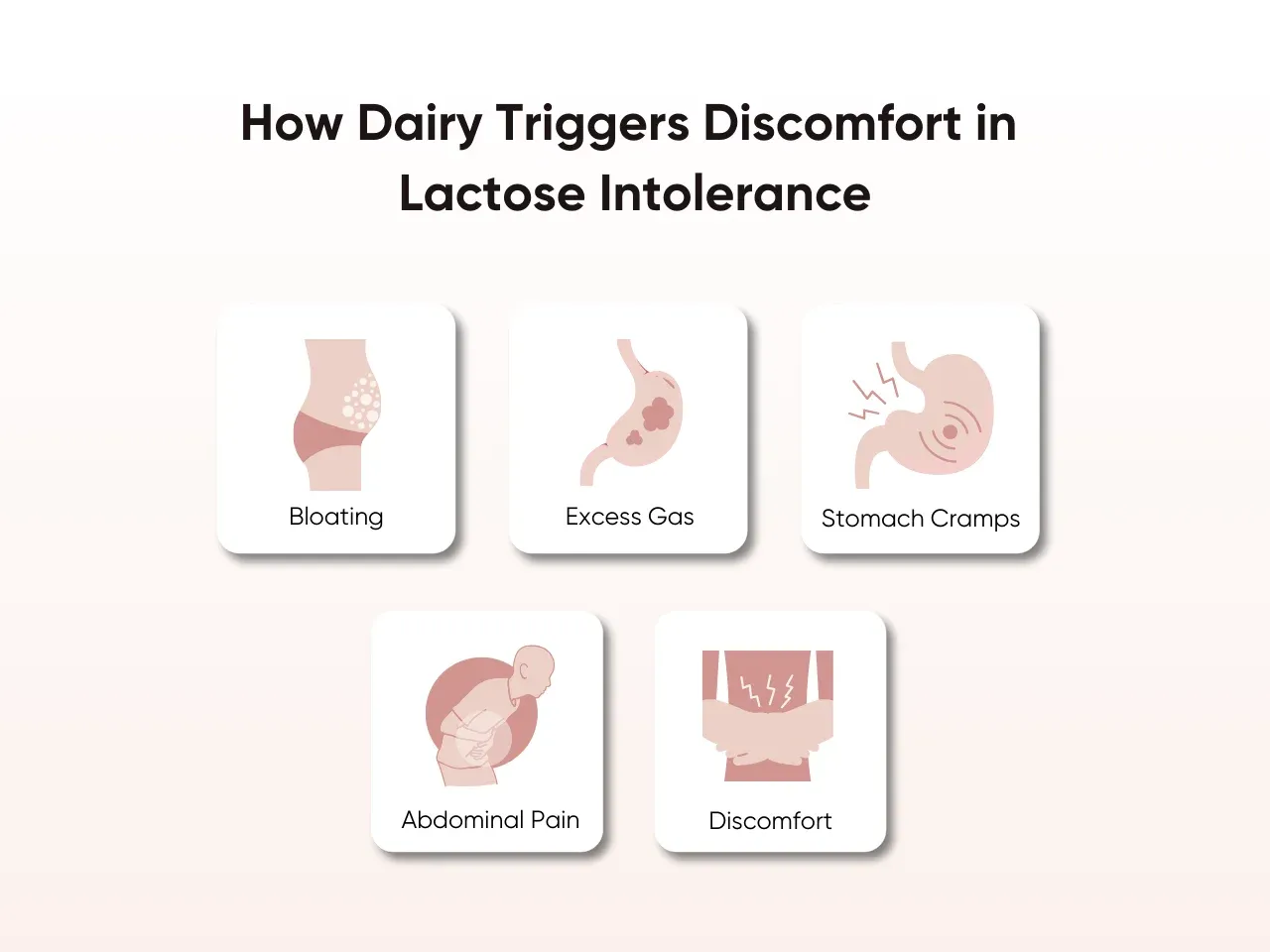
- Bloating from Gas Production: Undigested lactose ferments in the large intestine, leading to gas buildup.
- Excess Gas Leading to Flatulence: Lactose fermentation creates excess gas in the intestines, leading to frequent belching and flatulence.
- Stomach Cramps Due to Intestinal Irritation: When undigested lactose reaches the intestines, it irritates the intestinal walls, leading to cramping.
- Abdominal Pain from Fluid Accumulation: Undigested lactose draws extra water into the intestines. This fluid accumulation can cause symptoms of lactose intolerance, like cramping and abdominal pain.
- Discomfort from Persistent Symptoms: The ongoing issues from gas, bloating, and diarrhea can lead to overall discomfort, with the severity depending on the amount of lactose consumed and individual lactase levels.
Diarrhea and Dehydration
Lactose intolerance often results in diarrhea because undigested lactose ferments in the intestines, leading to loose, watery stools and frequent trips to the restroom. Below is how undigested lactose can cause a stomachache through diarrhea:
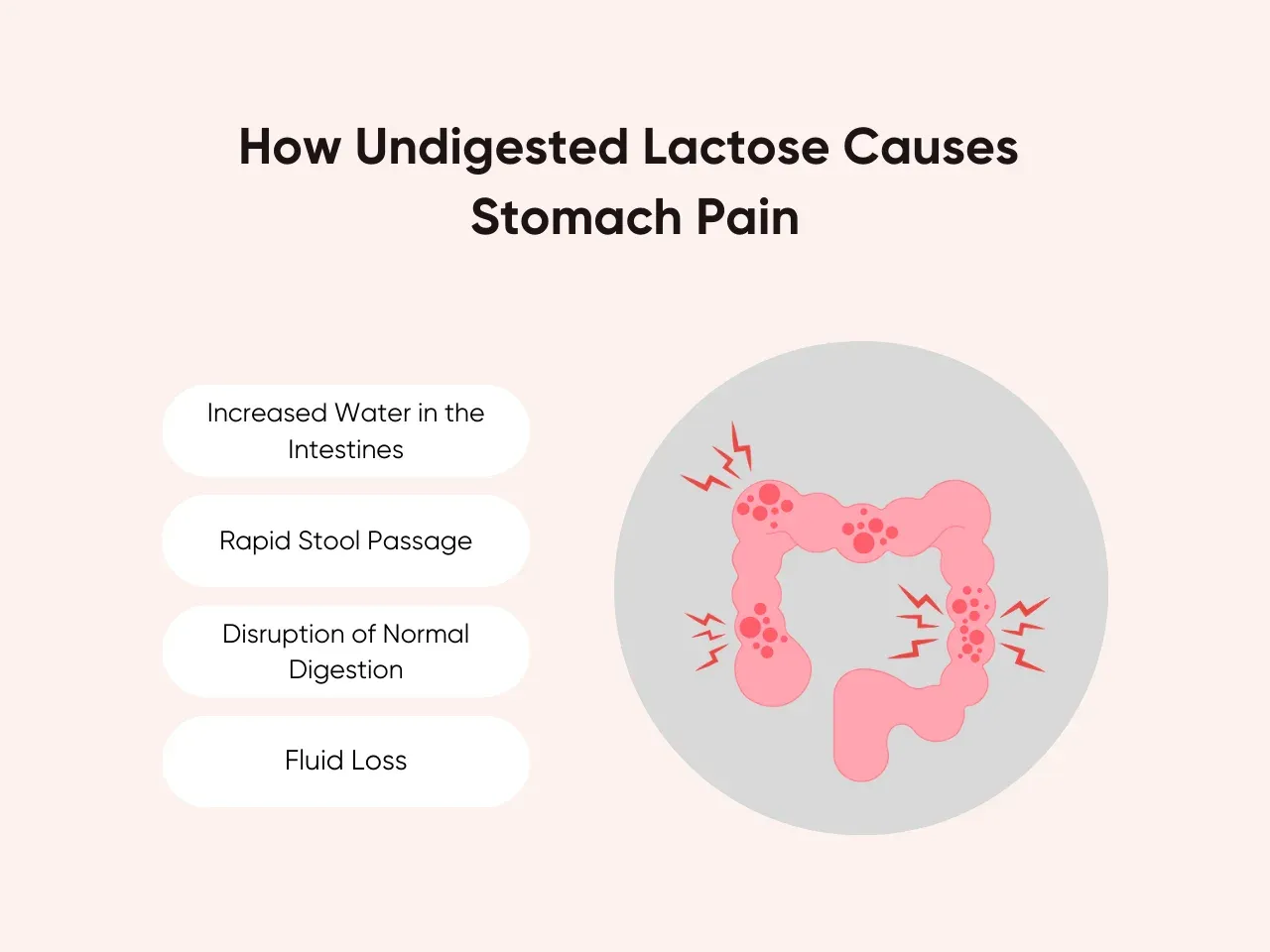
- Increased Water in the Intestines: Undigested lactose draws extra water into the intestines, creating loose, watery stools and triggering diarrhea.
- Rapid Stool Passage: The presence of undigested lactose speeds up the movement of stool through the intestines. This rapid transit time often results in diarrhea and frequent bowel movements.
- Disrupted Digestion: The fermentation of lactose disrupts the normal digestive system process. Interference leads to diarrhea accompanied by abnormal and forceful bowel movements.
- Fluid Loss: Frequent diarrhea leads to significant fluid loss, increasing the risk of dehydration, especially if left unmanaged, which is what happens if you ignore lactose intolerance.
Nausea and Vomiting
Some individuals may feel nauseous or even vomit after consuming lactose-rich foods. This is because the body fails to digest lactose well. Frequent nausea or vomiting after eating dairy can be a sign of what happens if you ignore lactose intolerance.
Identifying these symptoms early can help you keep your condition under control. Pay attention to how your body reacts to dairy products to avoid worsening symptoms.
Long-Term Consequences of Ignoring Lactose Intolerance
Ignoring lactose intolerance can lead to ongoing health issues that extend beyond immediate discomfort. Continued consumption of lactose leads to long-term harm and complicated health issues. The long-term effects of ignoring lactose intolerance include:
Damage to the Gut and Microbiome
The gut and the microbiome are essential for digestive health and balanced immunity. Not addressing lactose intolerance can lead to long-term damage in these areas. What happens if you ignore lactose intolerance includes the irritation that lingers and affects the gut lining and the microbiome. The chronic irritation by lactose, therefore, affects the gut lining and disrupts gut bacteria balance through the following:

- Inflammation of the Gut Lining: Persistent lactose exposure inflames the gut. This inflammation can damage the gut lining, leading to discomfort and digestive issues.
- Disruption of Gut Bacteria: The fermentation of undigested lactose disrupts the balance of gut bacteria, allowing harmful bacteria to thrive while reducing beneficial ones.
- Increased Gut Permeability: Chronic lactose malabsorption increases gut permeability. The harmful substances pass through small intestines and the bloodstream, contributing to overall health problems.
- Digestive Imbalances: An imbalance in gut bacteria leads to digestive problems. Symptoms such as bloating, gas, and irregular bowel movements become more common.
- Compromised Immune Function: Once destroyed, the microbiome weakens, followed by a compromised immune system. This quickly reduces the body's ability to fight against infections and restore health.
Risk of Nutrient Deficiencies
Calcium and vitamin D are crucial for bone health and well-being,a nd those with lactose intolerance may miss these key nutrients if they avoid dairy without proper substitutes. What happens if you ignore lactose intolerance can include risking deficiencies in essential vitamins and minerals. Without dairy, your calcium intake may drop, weakening bones and teeth.
Similarly, vitamin D is crucial for calcium absorption, so lacking both worsens bone health. To prevent this, consider fortified plant-based milks or supplements, and maintain a balanced diet, especially as you age.
Potential Weight Loss or Gain
Weight changes may be associated with what happens if you ignore lactose intolerance due to gastrointestinal symptoms like bloating, nausea, and diarrhea. These symptoms can alter appetite, often leading to unintended weight loss or gain. Neglecting lactose intolerance may further disrupt eating habits, causing unhealthy patterns. Here is how:
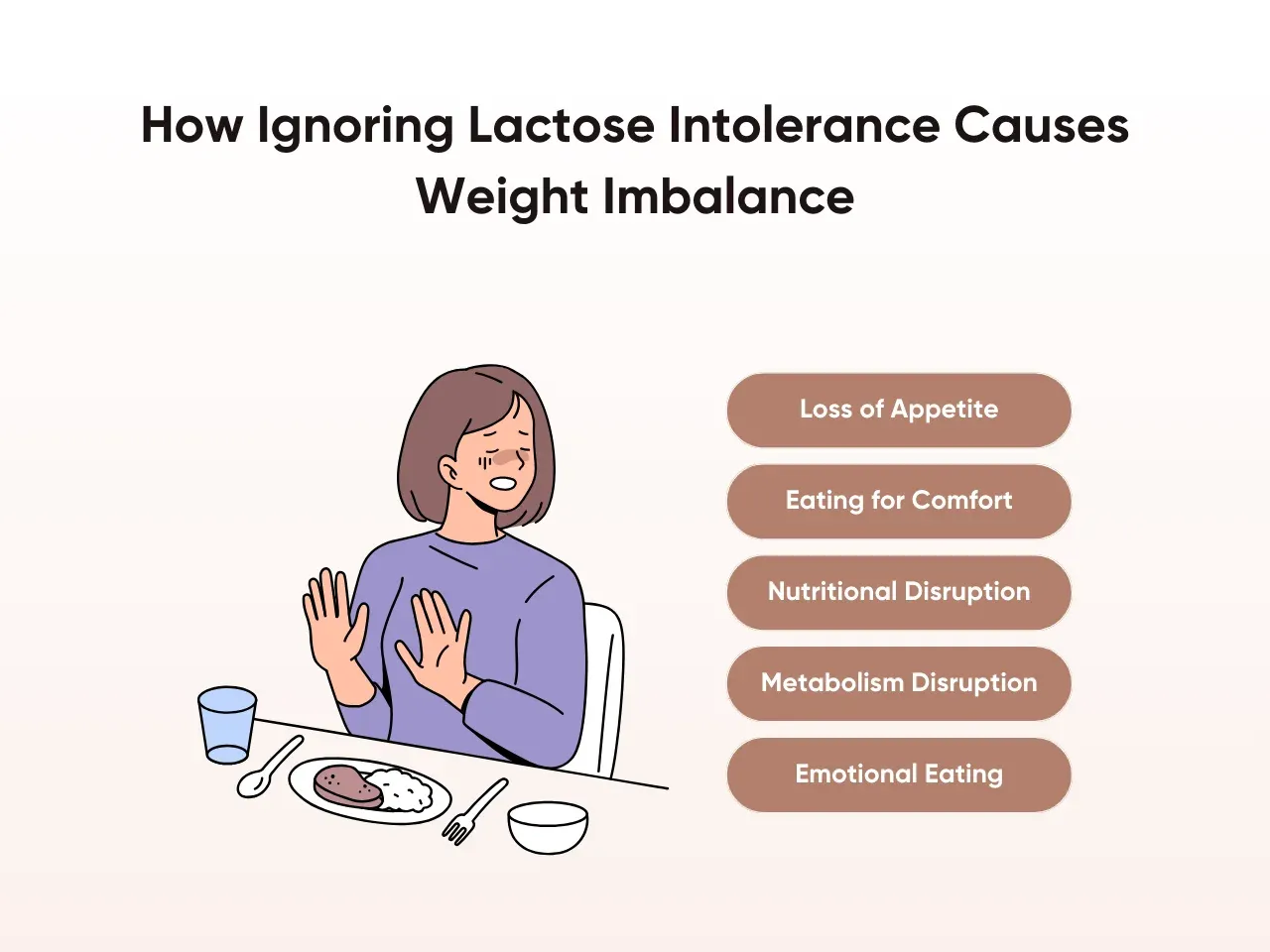
- Loss of Appetite: Gastrointestinal discomfort can reduce your desire to eat, leading to unintentional weight loss.
- Eating for Comfort: Some may overeat to soothe discomfort, resulting in weight gain.
- Nutritional Disruption: Avoiding certain foods disrupts your nutrition, impacting your weight and overall health.
- Metabolism Disruption: Chronic pain and modifying eating patterns may disrupt the metabolism. This can result in weight gain or weight loss.
- Emotional Eating: Pain management of ongoing symptoms may induce emotional eating, causing fluctuating weight patterns.
How to Manage Lactose Intolerance Properly
Effective lactose food intolerance management depends on understanding what happens if you ignore lactose intolerance and adapting your diet and lifestyle. Proper management prevents uncomfortable symptoms and keeps you in good health. The following management tips are very crucial for lactose intolerance patients:
Lactase Supplements
Knowing what happens if you ignore lactose intolerance can help you manage your diet better. Getting enough lactase supplements is one option. It can ease the discomfort of what happens if you ignore lactose intolerance. The reasons why getting lactase enzyme pills can help individuals digest lactose and prevent their symptoms include the following:
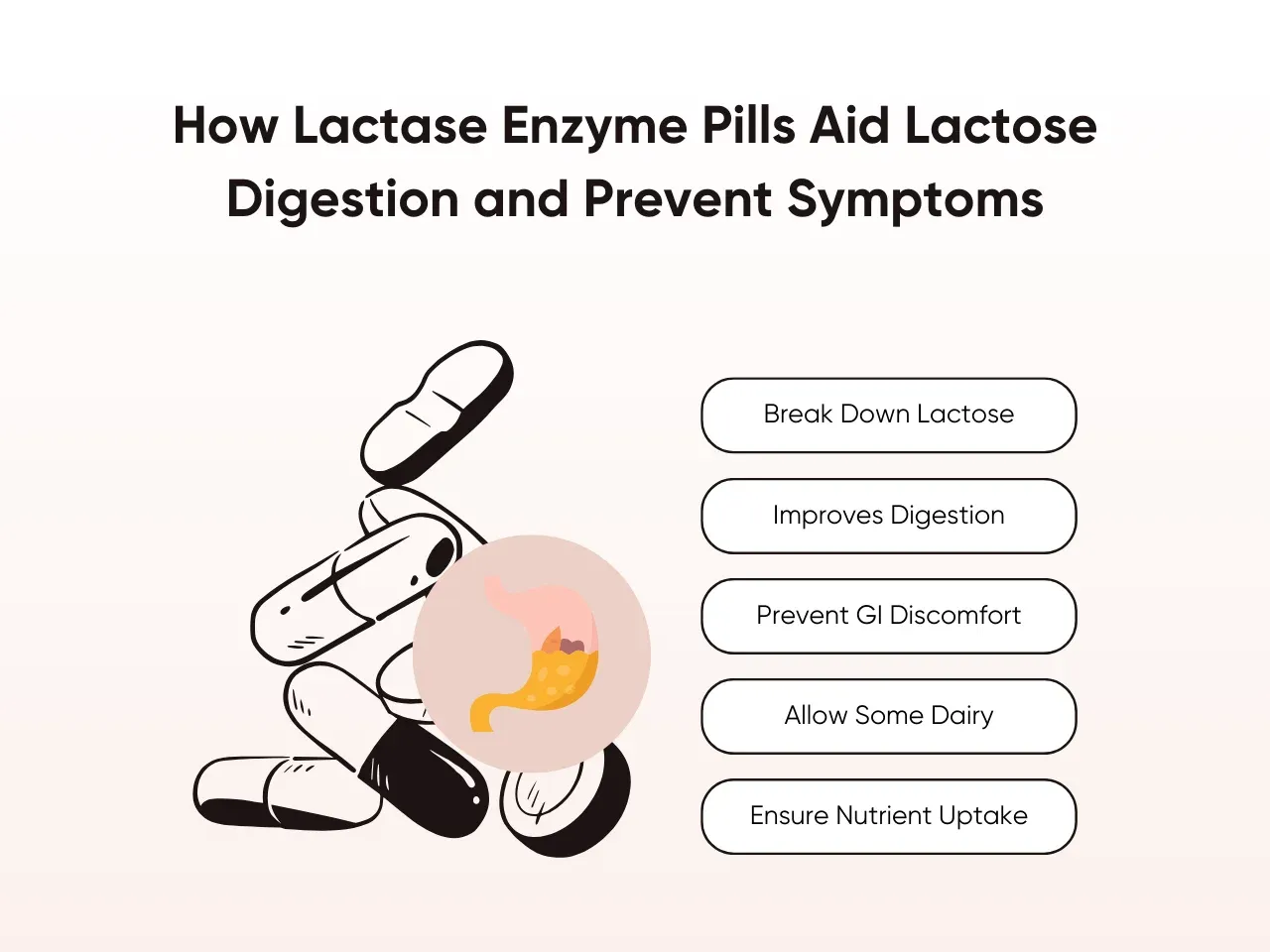
- Break Down Lactose: This dairy digestive supplement delivers the enzyme required to break down lactose, preventing what happens if you ignore lactose intolerance. It helps with the effortless digestion of dairy and alleviates the symptoms.
- Improves Digestion: Taking these supplements just before the dairy intake generally improves digestion, and people suffer fewer problems like bloating and gas.
- Prevent Gastrointestinal Discomfort: The best lactose intolerance pills prevent the discomfort resulting from undigested lactose. Hence, it makes for a much more comfortable meal.
- Allow Some Amount of Dairy Products: Using lactase supplements, one can consume dairy products in small amounts. This flexibility enables a person to add more dairy products to their diet.
- Ensure Nutrient Uptake: Lactase supplements help you continue enjoying a regular diet, as what happens if you ignore lactose intolerance will not be triggered. This ensures you get essential nutrients from dairy products without discomfort.
Adopting a Lactose-Free Diet
Adopting a lactose-free diet is a practical approach to managing lactose intolerance. What happens if you ignore lactose intolerance can include persistent digestive issues, so removing lactose from your diet can prevent these problems. Opt for lactose-free or dairy-free alternatives like almond milk, soy milk, and lactose-free yogurt, which offer similar taste and texture without causing discomfort.
This nutritional change minimizes side effects caused by low lactase production. Also, remember to read food labels to confirm that such foods are, in fact, lactose-free. These adjustments will help you enjoy a wide variety of food without the negative impacts of lactose.
Consulting a Healthcare Professional
Consulting a medical professional would be advisable to deal with lactase deficiency properly. They would enlighten you on what happens if you ignore lactose intolerance and also provide advice based on your condition. A healthcare provider would help you in the following ways:
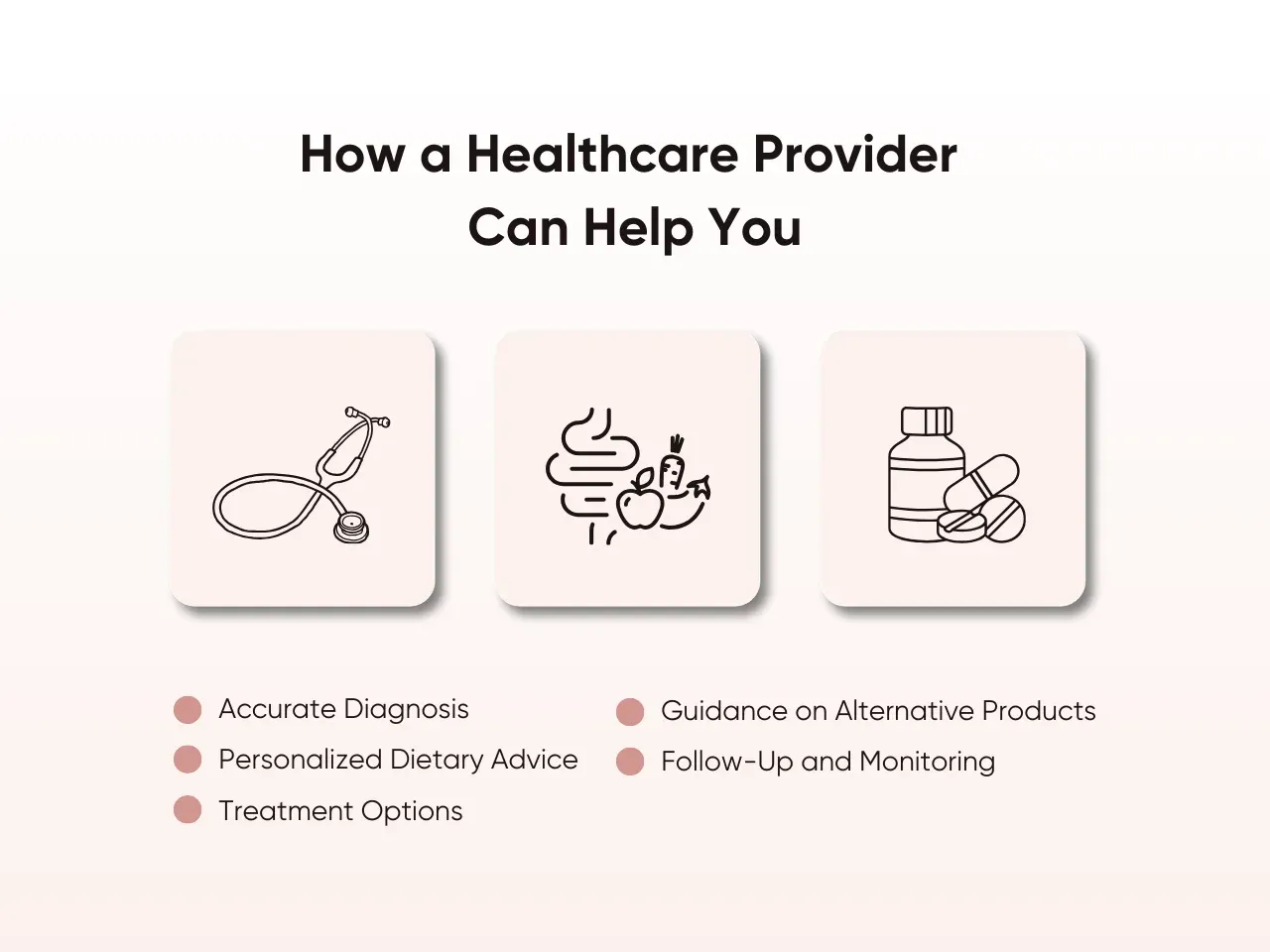
- Accurate Diagnosis: A healthcare professional can perform tests to confirm if you have lactose intolerance. This lactose tolerance test usually includes a hydrogen breath test, acidity test, or blood test to look for signs of lactose intolerance.
- Personalized Dietary Advice: They can give personalized dietary advice according to the types of lactose intolerance that you have. This helps you to avoid fewer symptoms while taking the required nutrients.
- Treatment Options: The healthcare provider will also suggest treatments and supplement intake. This includes some options like lactase enzyme pills that will make your condition easier to handle.
- Guidance on Alternative Products: They can recommend lactose-free or dairy-free products, helping you avoid what happens if you ignore lactose intolerance. This guidance helps you decide what to include in your diet.
- Follow-Up and Monitoring: A follow-up appointment allows for monitoring your progress and adjusting the management plan if necessary. This follow-up support will help you manage lactose intolerance symptoms and prevent potential complications.
Key Takeaway
Understanding and managing lactose intolerance is the key to your health and comfort. What happens if you ignore lactose intolerance can lead to both short-term discomfort and long-term health issues. Taking steps like choosing lactose-free foods or taking lactase supplements can manage your symptoms and avoid severe problems.
Seeing a healthcare professional can provide tailored advice and help you stay on track with your management plan. By following these steps, you can enjoy dairy without discomfort. Taking control of your lactose intolerance helps maintain your health and ensures a more comfortable, enjoyable lifestyle.
Concerned about the long-term issues of what happens if you ignore lactose intolerance? Milktab provides advanced lactase supplements that help you enjoy dairy without discomfort and complications. Our products are formulated to support healthy digestive functions through powerful enzymes and on-the-go convenience. Contact us at contact@milktab.co to learn how we can help you manage lactose intolerance effectively.